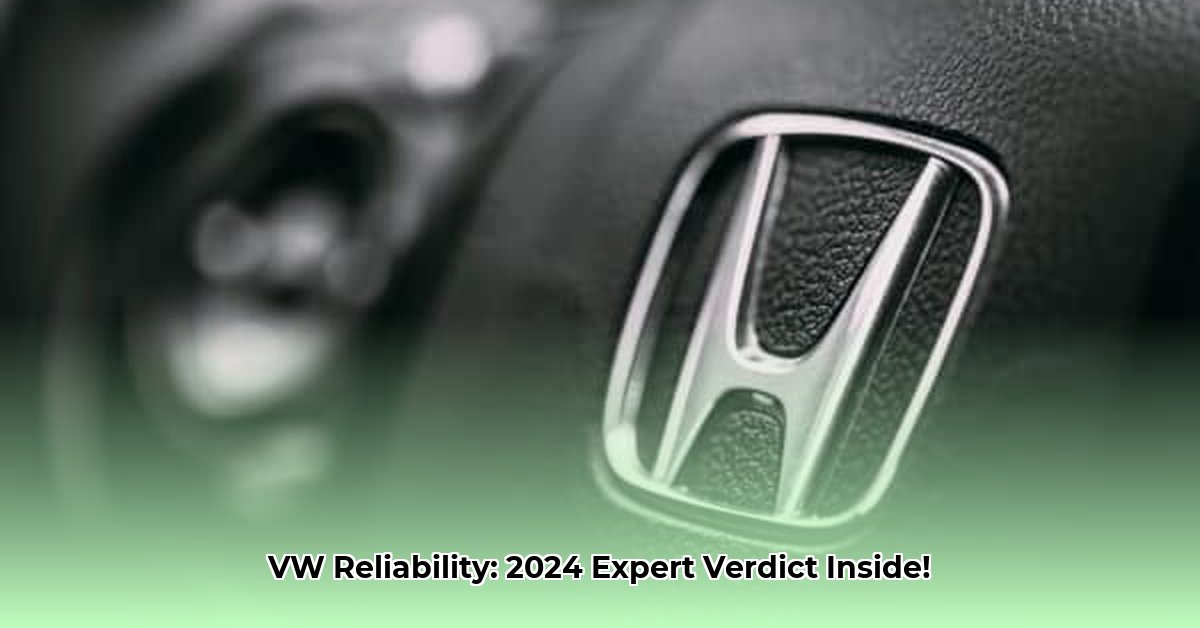Thinking about buying a Volkswagen, or maybe you already own one? Let’s be honest, you’ve probably heard mixed things about how reliable they are. This guide cuts through the confusion. We’ll look at what makes some Volkswagens more dependable than others, give you practical tips to keep your VW running smoothly, and bust some common myths. Whether you’re shopping around, already own a VW, or just want to know what the deal is, we’ll give you the straight facts so you can make smart choices about your car.
Are Volkswagens Reliable? Unveiling the Truth
So, are Volkswagens reliable? That’s a question many people ask before buying a used or new car. The short answer is: it depends. Reliability isn’t black and white; it’s more like a shade of gray that varies wildly depending on the specific model and year. Let’s dive in and explore this complex issue, considering aspects like Volkswagen maintenance costs and long-term reliability.
Volkswagen’s Reliability: A Historical Perspective
Older Volkswagens, especially the Golfs and Jettas made before the 2010s, have a reputation for being tough and long-lasting. Think of them as the reliable workhorses of the VW family. Their 1.8L engines, in particular, are practically legendary for their durability. These cars often racked up impressive mileage with relatively few major problems. But the story changes somewhat with the newer models, impacting the overall Volkswagen ownership experience.
Some newer Volkswagen engines, like the 1.4 TFSI (Turbo Fuel Stratified Injection) and the 2.0T, have unfortunately experienced some documented issues. These issues, alongside problems reported in certain DSG transmissions (Direct-Shift Gearbox that’s the dual-clutch automatic transmission) and some electrical systems, have created a more complicated picture of overall reliability. Independent studies generally place Volkswagen reliability somewhere in the middle of the pack. They often out-perform some luxury European brands, but they usually fall short of the reputation Japanese manufacturers have for dependability. Are newer Volkswagens as reliable? The data suggests a more nuanced answer.
What the Experts Say: Deciphering Reliability Surveys
Major car reliability surveys, like those from Consumer Reports and J.D. Power, offer valuable insights, although their findings can sometimes be nuanced. While the exact numbers vary from survey to survey, the general consensus seems to be that Volkswagen’s reliability falls somewhere in the average-to-below-average range. This doesn’t mean all Volkswagens are unreliable; it simply means that some models and years have been more prone to problems than others. It’s crucial to look at the specific model when assessing reliability. Understanding these surveys helps in properly assessing Volkswagen’s long-term dependability.
Trouble Spots: Engines, Transmissions, and Electrical Systems
Let’s get a little more specific about some of the common problem areas reported by owners. Certain engines and transmissions have popped up more often in complaints than others. The 1.4 TFSI and 2.0T engines, for instance, have shown a higher-than-average failure rate in certain model years, often linked to oil consumption and carbon buildup. The DSG transmission, known for its smooth shifts when working correctly, has also been a source of frustration for some owners due to mechatronic unit failures and jerky shifting. Furthermore, electrical issues, ranging from faulty sensors to infotainment system glitches, are frequently cited. These problems can, unfortunately, lead to expensive repairs.
What You Can Do: Advice for Buyers and Owners
For Prospective Volkswagen Buyers:
- Do Your Homework: Before you hand over any money, thoroughly research the specific model and year you’re considering. Dive deep into independent reliability reports and owner forums. Pay attention to recurring problems mentioned by others. Consider a pre-purchase inspection by a trusted mechanic.
- Budget Smartly: Factor in the possibility of needing more repairs than you might expect with some other brands. An extended warranty might give you some peace of mind, but carefully consider the cost-versus-potential benefits.
- Consider Age and Mileage: A well-maintained older Volkswagen might be a smarter bet than a newer model with known issues. Lower mileage generally results in fewer problems. Review the car’s maintenance history meticulously.
For Current Volkswagen Owners:
- Stick to the Schedule: Follow the manufacturer’s recommended maintenance schedule meticulously. This is crucial for preventing many potential problems from ever arising. Use manufacturer-approved parts and fluids.
- Address Issues Promptly: Don’t ignore even small issues; get them checked out right away. A small problem today can easily become a giant headache (and expense) down the road.
- Shop Around for Service: If you’re unhappy with the service at your local dealership, don’t hesitate to explore other options, such as independent mechanics who specialize in Volkswagen repairs. Read online reviews before choosing a new mechanic.
- Keep Detailed Records: Maintain thorough and accurate maintenance records. These records will prove invaluable if you ever need to make a warranty claim or sell your vehicle.
For Volkswagen (the company):
- Prioritize Reliability: Continue investing in research and development to improve the long-term reliability of your vehicles. Addressing known issues proactively is essential.
- Clear Communication is Key: Be transparent and upfront with customers about any known potential problems and the steps being taken to address them.
- Parts Availability: Ensure that replacement parts are readily available and reasonably priced. Long wait times for parts are a major source of frustration for owners. Regularly assess parts supply chains to minimize delays.
- Improve Dealership Service: Implement stricter quality control measures for dealership service departments. Provide ongoing training for technicians to ensure they are up-to-date on the latest repair procedures.
Reliability by Model: A Quick Glance
This table provides a very general overview. Reliability varies by year and specific options. Always conduct thorough research before purchasing.
| Model | Years | Engine Type | General Reliability Impression | Common Issues (Examples) |
|---|---|---|---|---|
| Golf | Pre-2010 | 1.8L | Generally Excellent | Minor issues, usually quite durable |
| Jetta | Pre-2010 | 1.8L | Generally Excellent | Minor issues, usually quite durable |
| Golf | 2015-2019 | 1.4 TSI | Fair to Average | Engine problems, oil leaks, some DSG issues |
| Passat | 2012-2017 | 2.0 TSI | Fair to Average | Engine issues, potential electrical problems |
| Tiguan | 2009-2017 | 2.0 TSI | Average | Turbo failure, oil leaks |
| Atlas | 2018-Present | 3.6L VR6, 2.0 TSI | Below Average | Fuel injector issues, excessive engine noise |
(Note: These are general impressions based on available data. Actual reliability can vary significantly. Consult with repair professionals and owner reviews for the most up-to-date information.)
So, are Volkswagens reliable? The answer isn’t simple. With careful research, responsible maintenance, and a realistic understanding of the potential risks, you can greatly improve your chances of a positive ownership experience. Remember that ongoing research continues to shed light on long-term reliability, so stay informed.
How to Avoid Common Volkswagen Engine Problems
Volkswagen ownership can be a rewarding experience, offering a unique blend of German engineering and stylish design. However, like any car brand, VWs have their share of common engine problems. By understanding these issues and taking proactive steps, you can minimize the risk of costly repairs and keep your Volkswagen running smoothly for years to come.
Understanding the Volkswagen Reliability Landscape
Volkswagen’s reliability isn’t a simple yes or no answer. It’s a nuanced story. While some models have a solid track record, others have faced well-documented issues. The key is knowing which characteristics to look for. This is where understanding how to avoid common Volkswagen engine problems becomes critical.
Common Culprits: Engines, Transmissions, and More
Several components frequently cause headaches for Volkswagen owners. The 2.0T TSI (Turbocharged Stratified Injection) engine, while powerful, can suffer from issues like oil leaks, carbon buildup on intake valves (especially in direct-injection engines), and turbocharger failure. Similarly, the DSG dual-clutch transmission, while offering quick and smooth shifts, has a history of problems, particularly with the mechatronic unit (the transmission’s control module). Electrical gremlins, ranging from sensor malfunctions to infotainment system glitches, are another common complaint.
How to Avoid Common Volkswagen Engine Problems: A Proactive Approach
The best way to avoid major engine woes is a proactive approach. This requires a multi-pronged strategy:
- Pre-Purchase Research: Before buying any used Volkswagen, conduct thorough research. Check online forums, owner reviews, and reliability ratings for the specific model, year, and engine you’re considering. Pay close attention to recurring problems reported by other owners.
- Pre-Purchase Inspection: Have a qualified mechanic perform a pre-purchase inspection before you commit to buying a used Volkswagen. This inspection should include a thorough check of the engine, transmission, electrical system










